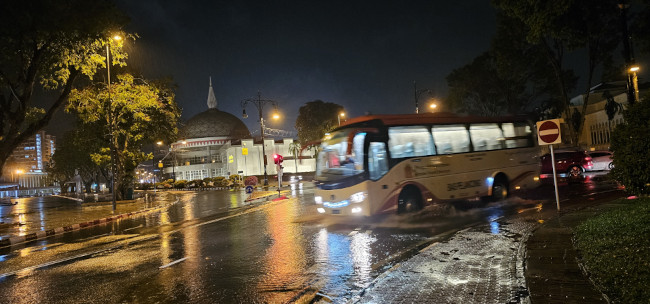Traveler's guide to Brunei: Everything you need to know before visiting
Updated Thursday 11 July 2024
Best time to visit Brunei
Plan your trip to Brunei carefully to avoid the holy month of Ramadan in March and April. During this time, shops and restaurants are closed during the day, making it difficult to explore and find places to eat. Additionally, heavy rain is common in Brunei during these months, which can lead to flooding and limited mobility.
If you decide to visit Brunei before or during Ramadan, be sure to plan ahead and schedule your activities around the restricted opening hours of establishments. Be prepared for frequent rainfall, especially in the afternoons and evenings, which can make navigating the country challenging.

Cost of living in Brunei: What to expect
Brunei has become one of the most expensive countries in Southeast Asia due to inflation. However, the high costs of living should not be mistaken for its luxury and wealth (see below). Most goods and produce are imported, leading to the high prices. The prices have risen primarily due to the country's heavy reliance on importing goods and produce from overseas, including countries like Australia, Malaysia, and Indonesia.
Food prices in Brunei can vary depending on whether you choose to dine out at restaurants or cook at home. Eating out at Western or international restaurants can be pricey, while local hawker stalls and markets offer more affordable options. Imported goods, including groceries, tend to be more expensive than locally produced items.
Accommodation options in Brunei
Travelers looking to save money should consider opting for AirBnbs over traditional hotels for their accommodation. AirBnbs often provide amenities such as washing machines and water makers, which can help cut down on expenses. Additionally, many hotels in Brunei have a dated 90s aesthetic, which may not appeal to all travelers.
Ideal length of stay in Brunei
Most visitors should plan for a 2-3 day stay in Brunei to experience the country's main attractions and culture.
Getting around Brunei
The most convenient way to get around Brunei is by renting a car, as the majority of locals rely on personal vehicles and there are few pedestrian-friendly paths. Pedestrians may need to navigate main highways where businesses are situated, sometimes resorting to jaywalking. Additionally, streets in Brunei are often unlit after dark, posing a potential hazard with stray dogs frequently roaming the roads.
Brunei's luxurious mystique
Many wonder, is Brunei a rich country? The answer lies in its bountiful natural resources, particularly its oil industry, which fuels the government's revenue and allows them to provide essential public services such as healthcare, education, and employment opportunities to their citizens. This certainly qualifies Brunei as a wealthy nation. However, it is crucial not to mistake this national wealth with the lifestyle of individuals within the country.
Brunei often falls victim to an unfair portrayal on social media, misleading many to believe it is solely a destination for those seeking a life of luxury. This misconception arises from the global attention it receives when hosting traditional weddings, which many associate with the country's overall lifestyle expectations. While it is true that Brunei boasts breathtaking and magnificent mosques, the luxury narrative predominantly applies to a select few public buildings.
It is important to recognize that beyond these showcases of opulence, the outskirts of Brunei still have populated areas lacking access to basic amenities like electricity and internet connectivity. This disparity stands as a testament to the diversity and complexity of Brunei's development.
Brunei, with its small population, contrasts with neighboring countries like the more heavily populated Philippines, Malaysia, and Indonesia. Therefore, comparing Brunei's wealth with these countries does not provide a truly accurate perspective.
Visitors and expatriates coming to Brunei should expect housing, public services, and living standards comparable to neighboring countries like Malaysia and Thailand. The emphasis on luxury and wealth should not overshadow the genuine experiences and offerings available in the sultanate.
Therefore, it is imperative to shed the misconception that Brunei is solely defined by its oil industry, luxury, and affluence. Doing so allows us to discover and appreciate the true essence of this country, whether it be through visiting in person or exploring its unique qualities from the comfort of our screens.
→ Safety instructions for visitors travelling to Brunei